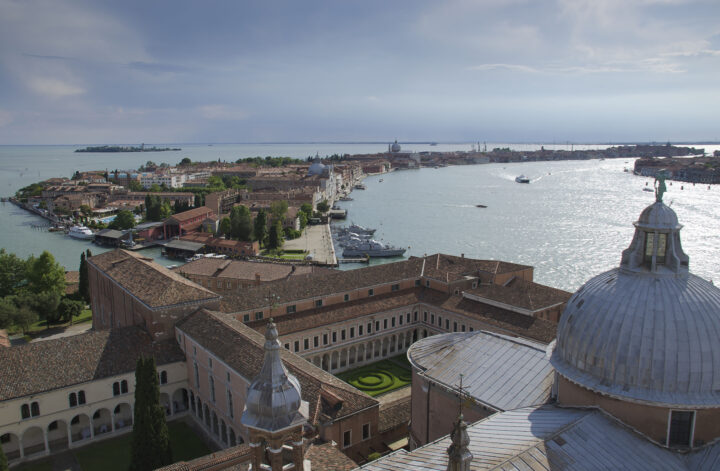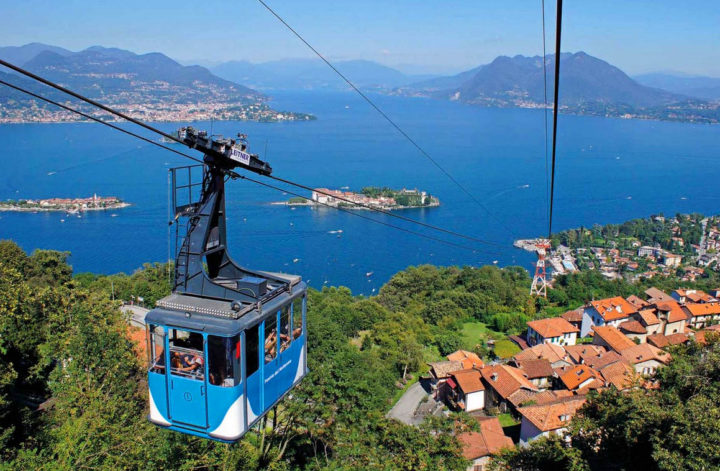“Though this be madness, yet there is method in it.” (Shakespeare, Hamlet)
1.
I edited a book, Utopia Giudecca, which has just been published. I wrote the introduction and the position paper, inviting eighteen scholars and professionals to propose their projects according to my provided guidelines. The following is my introduction. Giudecca is the largest island in the historic center of Venice and the most peripheral one.

The pivot question was how to make a community of 5,000 people almost entirely self-sufficient in food, energy, waste disposal, education, and more.
2.
Max Horkheimer wrote, “Utopia has two aspects: the critique of what is and the representation of what ought to be. Its importance is essentially contained in the first moment. From a man’s desires, one can trace his actual situation.” Along these lines, my collaborators and I developed the research and the book.
We need new ethics in the relations between humanity and nature, and new technology and techniques will follow. I’ve worked and studied ethics and environmental policies in an academic environment for decades and still do. Now, I’ve decided to adopt a new approach. The novelty is twofold:
· First, the utopian approach is new to me; still, several writers and philosophers have employed it over time
· Second, in my position (or better framework) paper, I use a narrative style that does not affect scholarly consistency.
3.
In the position paper, I write in a narrative style rather than as an academician to make it easier to read and emphasize the dreamlike dimension. My writing is oneirically ironic and ironically oneiric. Though it may look entertaining, it has a method, like in Hamlet’s madness. My scholarly competence was meant to connect diverse disciplines and authors.
Instead, the contributions that follow the introduction are essays with consistent disciplinary content that give concreteness and presuppose actual viability for sometimes even radical change in environmental, civic, educational, and economic policies. I then present possible ways of thinking and solutions to problems that foster an alternative lifestyle to the one that has become almost universally imposed.
The ground principle rests on reformulating the relationship between humanity and nature, which implies a bioethical approach to the environmental issue.
4.
I imagined an ecological community settled in Giudecca, the seventh subdivision (sestieri) of the historic center of Venice. Based on an outline description and some basic principles — the position paper and personal contacts — I invited specialists, technicians, and scientists to draft proposals, which I assembled in the volume.
I use the term ‘utopia,’ which requires semantic clarification. U-topia, in its proper etymological sense, would mean ‘nowhere.’ Instead, the text refers to a specific place. I retained this slight contradiction since the connection to an actual territory allows for better visualization of the imagination. The thoughts and situations presented could refer to any imaginary place, not just Giudecca. Also, Utopia sounds very similar to Eutopia, which refers to a ‘good and beautiful place.’
The choice of Venice was partly instrumental: it allowed me to connect to existing advanced studies and to initiate collaborations with scholars and colleagues working at the city’s universities and institutions.
On the other hand, the city’s international notoriety makes it evocative of a project that meets with global interest and visibility.
Giudecca and Venice are far from ‘nowhere’ or ‘non-places’ but become utopian as they are transformed by the imagination that turns a territory into an ecological model.
5.
Ecology is still, to a large extent, a ‘subversive’ science. It was defined so by Shepard P. and McKinley, and Shrader-Frechette and McCoy later elaborated on the concept. Ecology studies the relationships between phenomena and, from the epistemological point of view, challenges the scientific method inspired by Cartesian reductionism imposed in contemporary science despite the extensive environmentalist and systemic literature elaborated following the original theories of, among others, Edgar Morin, Fritjof Capra, Edwin Laszlo and a rich literature that has been continuously updated. Thus, the initiative involves intellectually radical content and concerns political issues.
The approach inspires creative thinking and innovative urban policies regarding construction, infrastructure, economy, society, and education, represented from a holistic perspective.
If we are exempted from being realistic, it is easier to maximize inventiveness because innovation, creativity, and free-thinking are believed to be operational tools to achieve a tangible goal, whether in the short or long term. The Kantian-inspired aphorism, ‘There is nothing more practical than a good theory,’ could be rephrased to ‘There is nothing more effective than an unworkable project.’ Demanding and imagining the impossible is much more realistic than it seems. Coming to grips with the environmental crisis requires a shift of focus from the technical to the political and philosophical context: this constitutes the inspirational thinking of my introduction, more extensively elaborated in my other studies.
The utopian dream has a fundamental quality: it is not a collection of existing practices imitated and replicated. Instead, utopia is a (non)place to consider the most unexpected and radical ecological solutions yet to be worked out.
One should believe in only some details of everything envisioned in any utopia (and in this volume). The purpose of utopia is to open up a different way of thinking. That is why it is dangerously revolutionary, no matter how seemingly unrealizable.
With the Giudecca utopia, we attempt to connect all the individual ideas and projects into an overall representation. A hypothetical ecological community is imagined and described, and indirectly, an idyllic society of tomorrow is hoped for while criticizing the current one.
In this book, reason ignites a real passion for change, a lust for change.
6.
Giudecca is Venice’s largest and most peripheral neighborhood (called Sestiere). It still has various urban activities, including residences for about 4,500 inhabitants, factories, craft workshops, retail stores, two luxury hotels, schools, an academy of dramatic arts, a theater, and a significant historical monumental heritage.
The other authors and I will present Utopia Giudecca in a narrative style to emphasize the visionary setting. In addition to the writings, images accompanying the texts help visualize the new imagined environment in a way that adds even more creativity.
Each of the initiative’s participants (including the authors of exclusively technical contributions) presents their ideas in a thought-provoking narrative. One imagines what Giudecca might look like in 2040, ten years after the utopia was initiated.
The description helps each participant indicate, position, and coordinate their proposals. Thanks to the framework provided, the participants had the opportunity to describe the technical details more precisely.
This editorial approach allows a perception of the holistic narrative of utopia and the presentation of single proposals and projects.
6.
The narrative (and the structure of the utopia) develops following the days of the week.
6.1
Monday is the day of the moon.
Since the moon influences many natural phenomena, we start from the first day of the week by describing how the ecological community of Giudecca produces some of the food residents need through agriculture, fishing, aquaculture, and animal husbandry.
We will consider the breeding and condition of nonhuman animals as they affect human health and diet and lend themselves to ethical and ecological considerations.
We also focus on natural ecosystems, including shores, beaches, forests, gardens, and parks.
It is the day of agronomists, geologists, farmers, biologists, zoologists, and animal scientists. Ethics scholars will also speak, addressing topics such as speciesism, nonhuman animal rights, the diatribe between eco-centrism and anthropocentrism, the definition of the Anthropocene, etc.
Prima facie, it is proposed that Giudecca become ‘green’ by extending the unpaved areas as much as possible, planting numerous trees, and cultivating vegetable gardens and fields. In summer, when viewed from above, the urban settlement is hardly recognizable as it is covered by vegetation that conceals most of the roofs, and tree leaves shade and hide the streets and part of the open spaces.
Orchards and vegetable gardens occupy another part of the open space, producing food and affecting the island’s ecological balance and microclimate.
Managing green areas, beaches, and open spaces is a crucial activity at Giudecca. Citizens do some of the work directly, and specialized small businesses do others.
6.2
On Tuesday (Mars’ Day, in Latin), we propose projects involving the built environment, housing, and infrastructure.
It is the day of architects, engineers, and technicians.
Ideas and proposals are requested:
(a) Concerning the use of environmentally friendly materials and techniques for energy-efficient housing
(b) Regarding the design of public spaces such as squares, parks, gathering places, sports facilities, beaches, etc.
(c) On green infrastructure for transportation, waste generation, collection, and recycling
(d) Concerning information and communication technologies designed and used to reduce environmental impacts
(e) on the production of energy
(f) On any other facilities for public services such as water, power distribution, schools, hospitals
(g) for the reduction — as much as possible — in the use of artificial materials (such as chemicals and metallurgical products that are overused today on par with excessive energy use for household appliances) that we can replace with natural materials and tools specially designed to reduce their consumption.
(h) Other.
6.3
We will focus on economics and trade on Wednesday (Mercury Day in Latin). It is the day of economists, industrialists, public and private finance specialists, and artisans.
The island must consider itself self-sufficient for most citizens’ needs, yet some goods will be produced for export and others imported.
In Utopia Giudecca, we will experiment with how a community of 5,000 can be self-sufficient for food, goods, and services and how much it must rely on trade and depend on large-scale organizations.
From another perspective, research and education are export-oriented core activities. As will be discussed on Friday, advanced education and research form the core of the initiative as a whole.
6.4
Thursday, Jupiter Day, will be devoted to political and social institutions. It will be the day of jurists and government.
Indeed, the Utopia Giudecca requires management. Participants in the initiative are invited to propose suitable institutions to govern the ecological community.
Some basic principles are inescapable. They inspire the institutional structure, bylaws, and regulations. The basic principles are ecological inspiration and direct citizen participation, with some necessary limitations during the initiative’s initial stages. It is important to note that ecological principles precede democratic ones. We will discuss this issue broadly.
Ecological inspiration and institutional structure will be freely developed and discussed in the island’s academic institutions.
6.5.
On Friday, the day of Venus, the focus will be on education and knowledge. Love and education are closely linked as knowledge flows from passion and is a powerful agent for personal and collective change.
It is the day of academics, intellectuals, and educators.
There is much to discuss regarding radical reforms of education systems at every level. Education was conceived and implemented about two centuries ago and has remained the same. Therefore, we offer some suggestions regarding a utopian approach to the entire educational system with consequences for the material structures that house it.
A more practical approach emphasizes the crucial importance of education, notably higher education, as it is envisioned as one of the initiatives to trigger the process of utopian change and attract a new population to the island.
6.6.
Saturday is the day devoted to discussion and a temporary synthesis.
6.7.
As everyone can expect, Sunday will be devoted to rest so that we can be ready to resume work on Monday.
7.
The book is in the bookstores but still needs to be finished. It remains open to possible new contributions to be included in the six days of ‘creation’, and the overall idea that generated it will continuously regenerate it.
It was preceded by a series of meetings in which the participants in this collective work proposed and discussed their innovative projects, which were later reported in the enclosed sheets.



